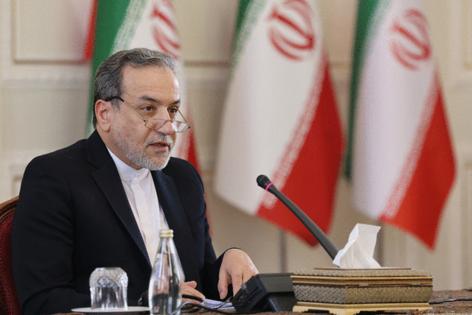Iran says ability to enrich uranium is 'non-negotiable' in Trump nuclear talks
Published in Political News
Iran said it won’t be drawn into negotiations with the U.S. over its ability to enrich uranium, a sign the diplomatic effort to resolve a years-long nuclear standoff may have hit its first stumbling block.
Iranian Foreign Minister Abbas Araghchi said he’d heard contradictory positions from his U.S. counterpart, Steve Witkoff, since a first meeting in Oman last Saturday that both sides described as constructive. The two are scheduled to meet again on April 19.
“Witkoff has made several different statements, but the real positions will become clear at the negotiating table,” Araghchi said on Iranian state TV on Wednesday. “They won’t gain anything through pressure.”
Iran needs “to hear their views in the negotiation sessions,” he added. “If they continue to present conflicting and contradictory positions, things will be difficult.”
Iran and the U.S. started talks on Saturday aimed at striking a deal that guarantees the Islamic Republic won’t develop nuclear weapons in exchange for sanctions relief. It’s a contentious issue that brought the two countries close to direct conflict during U.S. President Donald Trump’s first term.
In Witkoff’s first interview after the talks — which were mediated by the Omani government and took place in Muscat — the U.S. envoy said Iran must not be allowed to enrich uranium beyond a purity of 3.67%, a concentration suitable for power reactors but far below the level needed for bombs.
Tehran had agreed to that limit under the terms of a 2015 accord but later breached it after Trump abandoned that international deal during his first term in office.
The U.S. government backed away from Witkoff’s comments and he later revised his position in a social media post and said that “a deal with Iran will only be completed if it is a Trump deal.” Witkoff said that means Iran “must stop and eliminate its nuclear enrichment and weaponization program.”
Iran sees its uranium-enrichment capability as the bedrock of a decades-long nuclear program that consists of power plants used to generate electricity, as well as isotopes used for medicine and industry.
After Trump abandoned the original nuclear deal and reimposed sanctions on the Iranian economy, Iran started to gradually ramp up enrichment to 60%, a level of purity the International Atomic Energy Agency says is technically indistinguishable from weapons-grade fuel.
IAEA Director General Rafael Mariano Grossi is visiting Iran this week in an attempt to resolve his agency’s ongoing probe into uranium particles sampled at undeclared locations. Resolution of that investigation will play a key role in any potential deal.
Iran has repeatedly said that its nuclear program is for civilian use only and it’s ready to provide the Trump administration guarantees that it won’t pursue weaponization.
-----------
With assistance from Jonathan Tirone.
©2025 Bloomberg L.P. Visit bloomberg.com. Distributed by Tribune Content Agency, LLC.




























































Comments